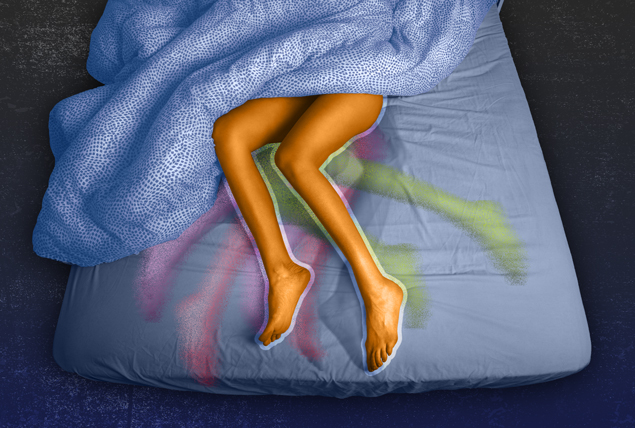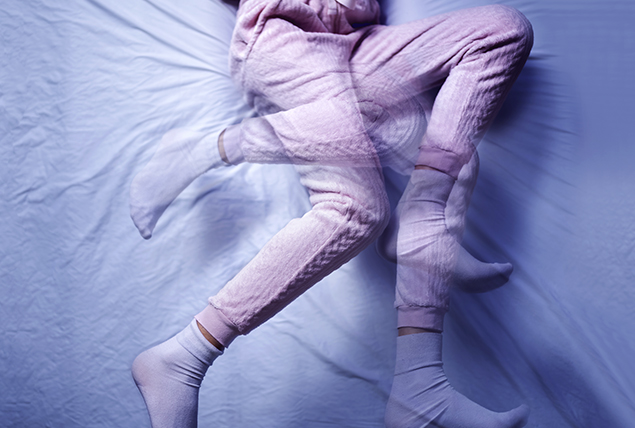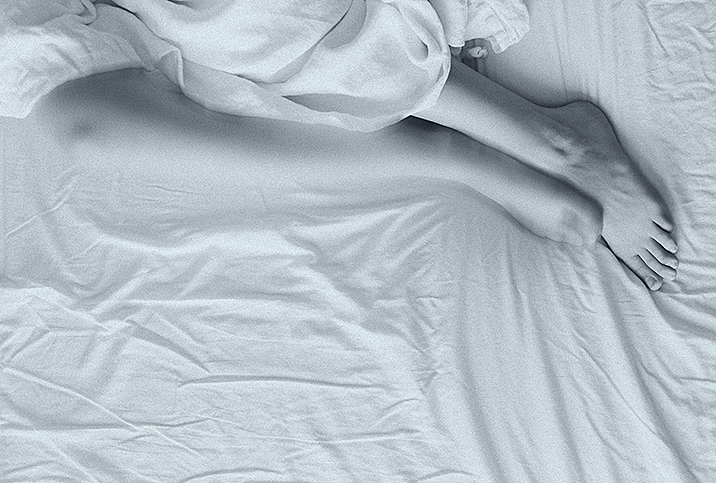What Do You Need to Know About Caring for Someone with RLS?

Key Points
- RLS can have a significant impact on sexual health, causing decreased libido, difficulty achieving or maintaining an erection, vaginal dryness and difficulty achieving orgasm.
- A strict bedtime routine benefits anyone, but investments like black-out curtains and nighttime phone locks can be life-changing for someone with RLS.
- A king-sized mattress that splits into separate beds may save the partner of someone with RLS from sleepless nights.
Restless legs syndrome (RLS) is a neurological and sleep disorder caused by a dopamine shortage. Because the condition has no known treatment, additional work is required to manage the disorder.
This means that building a support network can be essential.
Living and dating with RLS
Daniel Atkinson, GP, and clinical lead at Treated.com, based in Manchester, United Kingdom, highlighted the very real benefit of sleeping in for patients with restless legs syndrome.
"If their symptoms are significant then there's a very real chance that they could be struggling with sleep deprivation, fatigue or their mental health," Atkinson said. "If this is the case then you must try to be as understanding as you can of their struggles, and try to make accommodations where possible to allow them to catch up on their sleep when they can. Many people with RLS, for instance, find it easier to sleep in the morning when their dopamine levels are naturally higher."
Flexibility and a willingness to re-imagine certain expectations are vital. For instance, a king-sized mattress that splits into separate beds may save the partner of someone with RLS from sleepless nights. If it's comfortable, sleeping in thick socks and close attention to toenail length will also protect your partner.
Besides nighttime kicks, the most difficult part of casual dating with restless legs syndrome may be disclosing the condition. Given the lack of knowledge and occasional cynicism from certain medical practitioners, you may feel vulnerable having that conversation. Make sure the person you are confiding in is someone you trust and who cares for you.
Prevention, therapy and aftercare
Fred Pescatore, M.D., based in New York City, offered advice for putting the needs of a loved one with RLS before your own agenda to prevent enabling.
"The loved ones of people with RLS should know that it can be a difficult condition to manage and that it's important to help the person with RLS identify lifestyle changes that may help reduce symptoms, such as avoiding caffeine and alcohol, maintaining a regular sleep schedule, exercising regularly [and] the various treatment options available," Pescatore said.
While nothing is certain, minimizing exacerbating factors should reduce the severity of symptoms.
Marc Werner, a mattress inventor based in Plantation, Florida, focuses on the front lines of restless legs syndrome which he believes starts in the bedroom.
"Upgrade your sleep environment as needed to find the comfort needed to be well rested," Werner said. "This could be a weighted blanket to several options available to find some needed comfort."
A strict bedtime routine benefits anyone, but investments like black-out curtains and nighttime phone locks can be life-changing to someone with RLS.
Resources for patients and caregivers
Atkinson noted that there is no lack of community for those with restless legs syndrome, both digitally and in person.
"There are some excellent resources for RLS out there, be it online, via social media, physical publications or in-person," he said. "For both caregivers and patients, the Willis-Ekbom Disease Foundation website has a wide range of resources, such as a printable symptom diary. The Johns Hopkins Center for Restless Legs Syndrome is a great resource for providers, as it regularly maintains up-to-date information and research about the condition. The RLS-UK website is also a great resource for patients: providing advice, guidance, discussion forums and newsletters. There are also Facebook support groups for patients, [and] in-person support groups that can be found via the Willis-Ekbom Disease Foundation."
Pescatore emphasized the importance of a rapport with a trusted healthcare provider.
"The Restless Legs Syndrome Foundation is a reputable online resource that has nice information," Pescatore said. "I would suggest you consult your physician as a first step and ask them to point you in the direction of valuable and credible information."
While your doctor may know of websites that haven't been mentioned, these URLs can form a sturdy basis for research.
Stress and your sexual health
Given dopamine's role in arousal, it's no surprise that restless legs syndrome may impact other elements in the bedroom, according to Atkinson.
"RLS can have a significant impact on sexual health," Atkinson said. "It can cause decreased libido, difficulty achieving or maintaining an erection, vaginal dryness and difficulty achieving orgasm. It is important to talk to your doctor if you are experiencing any of these symptoms."
Pescatore noted that male sexual dysfunction correlates with restless legs syndrome, although there's no known causation.
"There is no direct known link between RLS and sexual health," Pescatore said. "However, there are some studies that suggest that men with RLS had a higher likelihood of concurrent ED, and the magnitude of the observed association was increased with a higher frequency of RLS symptoms. These results suggest that erectile dysfunction (ED) and RLS may share common determinants. More research is needed."
Atkinson explained that there is a vicious cycle of stress, sexual dysfunction and RLS.
"Chronic stress is thought to be linked to an increased risk of developing secondary RLS," Atkinson said. "This is because when someone suffers from chronic stress, changes in neurotransmitter levels can then cause restlessness, excitability and nervous actions such as RLS. It's also thought that stress can trigger RLS symptoms, too—for both primary and secondary RLS."
Stress is known to be a sexual buzzkill, as is being overly tired. Of course, those two conditions and restless legs syndrome are entirely interconnected.
Complications and related conditions
While the symptoms may feel the same to the patient, Atkinson suggested that there are differences in primary RLS and secondary RLS.
"Some other conditions can increase the risk of developing RLS, and when that happens it's called secondary RLS," he said. "Those conditions can include iron deficiency anemia, chronic kidney disease, diabetes, Parkinson's disease, Rheumatoid arthritis, underactive thyroid and fibromyalgia."
The rate of RLS diagnosis in women is exacerbated by pregnancy, which may initiate temporary restless legs syndrome.
"In some cases, pregnancy can also be a risk factor for RLS, too," Atkinson said. "But when this happens, it tends to only be temporary—with symptoms usually stopping a few weeks after delivery. RLS can also come with an increased risk of certain mood disorders, such as anxiety or depression."
Post-partum depression (PPD) and RLS's detriment to mental health—as well as the inevitable increased stress and limited sleep from caring for a newborn—are all potential contributors to a pre-existing case of restless legs syndrome.


















